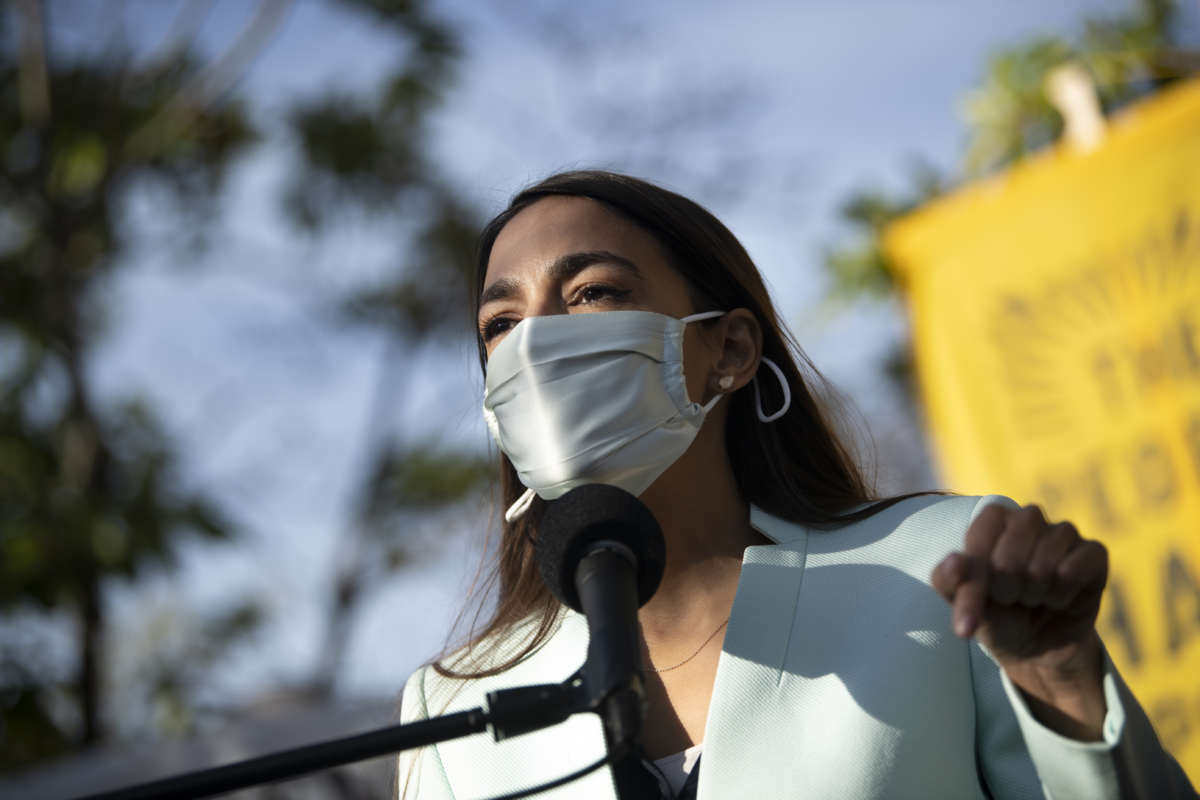Rep. Alexandria Ocasio-Cortez (D-New York) has criticized Vice President Kamala Harris’s recent comments on immigration, calling them “disappointing.”
During a visit to Guatemala on Monday, Harris issued a warning to Guatemalan migrants hoping to cross the U.S. border, telling them to stay away. “I want to be clear to folks in this region who are thinking about making that dangerous trek to the United States-Mexico border: Do not come. Do not come,” she said at a press conference with Guatemalan President Alejandro Giammattei.
“The United States will continue to enforce our laws and secure our border,” she continued.
Ocasio-Cortez expressed frustration with Harris and the Biden administration for these comments. “This is disappointing to see. First, seeking asylum at any US border is a 100% legal method of arrival,” she wrote.
Harris said in response to Ocasio-Cortez’s criticism that the Biden administration will focus on treating the “root causes” behind why asylum seekers are coming to the U.S. “That is my focus. Period,” she told NPR.
But, as the New York representative pointed out, the “root causes” of migration for many asylum seekers in Central America are often a result of U.S. actions and policies. “The US spent decades contributing to regime change and destabilization in Latin America. We can’t help set someone’s house on fire and then blame them for fleeing,” she wrote.
Indeed, the U.S. has been responsible for most, if not all, of Guatemala’s political unrest over the past decades.
In the mid-20th century, the CIA organized a coup d’etat that ended democratic rule in the country. Since then, the U.S. has continually quashed uprisings, backing wealthy right wing forces in the Guatemalan military, which effectively replaced the democratic government and was responsible for genocide against the Indigenous people in the region.
“It would be helpful if the US would finally acknowledge its contributions to destabilization and regime change in the region,” said Ocasio-Cortez on Twitter on Monday night. “Doing so can help us change US foreign policy, trade policy, climate policy, and carceral border policy to address causes of mass displacement and migration.”
Instead, Harris doubled down on a long history of aggressive U.S. foreign policy in her visit to Guatemala, announcing the creation of a task force made up of officials from the Justice, State and Treasury departments to “root out corruption wherever it exists.”
This sort of language in U.S. foreign policy is often a precursor to the U.S. using force against the governments and leaders that Washington officials have deemed problematic or corrupt in some way. There are, indeed, issues of corruption in many Central American countries — issues largely brought on by U.S. intervention.
But the Biden administration’s policies of exclusion for migrants show, to progressives, that the administration isn’t necessarily interested in true healing and reparations for these countries.
On Monday, for instance, the Supreme Court issued a blow to asylum seekers in the U.S., ruling that undocumented people in the U.S. with Temporary Protected Status (TPS) cannot apply for a green card, or permanent residency.
The Biden administration had been supportive of the decision to disallow undocumented TPS holders from obtaining green cards. Advocates argue that the U.S., by allowing TPS holders to reapply to stay in the country while still not creating a path for citizenship, is trapping people in immigration limbo and putting their lives at the mercy of the political whims of changing administrations.
Join us in defending the truth before it’s too late
The future of independent journalism is uncertain, and the consequences of losing it are too grave to ignore. To ensure Truthout remains safe, strong, and free, we need to raise $43,000 in the next 6 days. Every dollar raised goes directly toward the costs of producing news you can trust.
Please give what you can — because by supporting us with a tax-deductible donation, you’re not just preserving a source of news, you’re helping to safeguard what’s left of our democracy.
